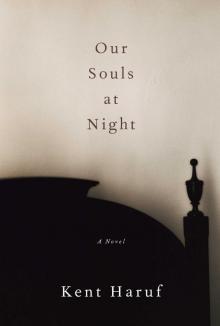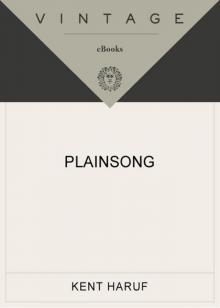- Home
- Kent Haruf
Plainsong
Plainsong Read online
Contents
Title Page
Dedication
Acclaim for Kent Haruf’s
Acknowledgments
Guthrie.
Victoria Roubideaux.
Ike and Bobby.
Guthrie.
Victoria Roubideaux.
Ike and Bobby.
Victoria Roubideaux.
Ike and Bobby.
Victoria Roubideaux.
Ike and Bobby.
McPherons.
Victoria Roubideaux.
Guthrie.
Ike and Bobby.
Victoria Roubideaux.
Ike and Bobby.
McPherons.
Ella.
Victoria Roubideaux.
McPherons.
Guthrie.
Ike and Bobby.
Guthrie.
Victoria Roubideaux.
Ike and Bobby.
McPherons.
Guthrie.
Victoria Roubideaux.
McPherons.
Guthrie.
Victoria Roubideaux.
McPherons.
Ike and Bobby.
Maggie Jones.
Victoria Roubideaux.
McPherons.
Ike and Bobby.
Guthrie.
McPherons.
Ike and Bobby.
Victoria Roubideaux.
Ike and Bobby.
McPherons.
Holt.
About the Author
Also By Kent Haruf
Copyright Page
For Cathy
And in memory of Louis and Eleanor Haruf
Acclaim for KENT HARUF’s
Plainsong
“If the novelist invents a world, then Mr. Haruf has shaped a place of enormous goodness. . . . The story itself—spare, unsentimental, rooted in action—honors the values of the community.”
—The Wall Street Journal
“Resonant, kind and generous.”
—The Boston Globe
“Compelling. . . . A lyrical meditation on community and family, and about how the former increasingly becomes the latter as traditional ties don’t prove binding.”
—Detroit Free Press
“A marvel of a book.”
—The Baltimore Sun
“Haunting, virtuostic writing. Inimitable, it is both spare and descriptive, as painstaking in capturing vagueness as it is precise in detailing the concrete.”
—San Francisco Chronicle
“Plainsong is nothing short of a revelation.”
—Richard Russo
“I read Plainsong in one sitting, unwilling—unable—to look up until I’d finished. Kent Haruf has given us a pure blessing of a book: a novel of such sweet amplitude, grace and humility.”
—Beverly Lowry
“Kent Haruf has written an American masterwork.”
—Howard Frank Mosher
A loud noise rumbles from this quiet novel . . . a deep language, like the rumble before an earthquake.”
—Los Angeles Times
“A balladeer’s vision of small-town America.”
—Entertainment Weekly
“Plainsong is like authentic Quaker furniture: Beautiful in its plainness.”
—USA Today
“Spare and beautifully effective. . . . A style as natural and unassuming as the world it describes.”
—National Public Radio
“Haruf has a keen eye for the devastatingly casual acts of cruelty that punctuate daily life. He’s simply convinced that decency is ultimately its own reward, and it’s this optimism, along with the quiet sophistication of his technique, that allows him to look into the hearts of his characters while still respecting their privacy.”
—Salon
“Plainsong is a lovely read, illuminated by sparks of spare beauty.”
—Time
“The voices of the characters ring so true that you expect to encounter them in your own life—and feel a little sad when you don’t.”
—San Antonio Express News
“Generously imagined and precisely rendered.”
—The Miami Herald
“Plainsong is a sweet novel. Not cloying, but kind and gracious, and enamored with the simplicity of a story based on human decency.”
—The Indianapolis Star
“Plainsong is written in fine, spare prose, and it’s generous in spirit. By the end, Plainsong is a moving look at our capacity for both pointless cruelty and simple decency.”
—Newsweek
The author wishes to acknowledge the generous support and encouragement of:
Mark Haruf, Verne Haruf, Edith and Bryan Russell, Sorel Haruf, Whitney Haruf, Chaney Haruf, Rodney and Gloria Jones, Richard Peterson, Laura Hendrie, John Walker, Jon Tribble, Ken Keith, Peter Matson, Gary Fisketjon, Dr. Tom Parks, Dr. Douglas Gates, Greg Schwipps, Alissa Cayton, Sue Howell, Karen Greenberg, Southern Illinois University, the Illinois Arts Council, and most particularly, Cathy Haruf.
Plainsong—the unisonous vocal music used in the Christian church from the earliest times; any simple and unadorned melody or air
Plainsong
Guthrie.
Here was this man Tom Guthrie in Holt standing at the back window in the kitchen of his house smoking cigarettes and looking out over the back lot where the sun was just coming up. When the sun reached the top of the windmill, for a while he watched what it was doing, that increased reddening of sunrise along the steel blades and the tail vane above the wooden platform. After a time he put out the cigarette and went upstairs and walked past the closed door behind which she lay in bed in the darkened guest room sleeping or not and went down the hall to the glassy room over the kitchen where the two boys were.
The room was an old sleeping porch with uncurtained windows on three sides, airy-looking and open, with a pinewood floor. Across the way they were still asleep, together in the same bed under the north windows, cuddled up, although it was still early fall and not yet cold. They had been sleeping in the same bed for the past month and now the older boy had one hand stretched above his brother’s head as if he hoped to shove something away and thereby save them both. They were nine and ten, with dark brown hair and unmarked faces, and cheeks that were still as pure and dear as a girl’s.
Outside the house the wind came up suddenly out of the west and the tail vane turned with it and the blades of the windmill spun in a red whir, then the wind died down and the blades slowed and stopped.
You boys better come on, Guthrie said.
He watched their faces, standing at the foot of the bed in his bathrobe. A tall man with thinning black hair, wearing glasses. The older boy drew back his hand and they settled deeper under the cover. One of them sighed comfortably.
Ike.
What?
Come on now.
We are.
You too, Bobby.
He looked out the window. The sun was higher, the light beginning to slide down the ladder of the windmill, brightening it, making rungs of rose-gold.
When he turned again to the bed he saw by the change in their faces that they were awake now. He went out into the hall again past the closed door and on into the bathroom and shaved and rinsed his face and went back to the bedroom at the front of the house whose high windows overlooked Railroad Street and brought out shirt and pants from the closet and laid them out on the bed and took off his robe and got dressed. When he returned to the hallway he could hear them talking in their room, their voices thin and clear, already discussing something, first one then the other, intermittent, the early morning matter-of-fact voices of little boys out of the presence of adults. He went downstairs.
Ten minutes later when they entered the kitchen he was standing at the gas stove stirring eggs in a blac
k cast-iron skillet. He turned to look at them. They sat down at the wood table by the window.
Didn’t you boys hear the train this morning?
Yes, Ike said.
You should have gotten up then.
Well, Bobby said. We were tired.
That’s because you don’t go to bed at night.
We go to bed.
But you don’t go to sleep. I can hear you back there talking and fooling around.
They watched their father out of identical blue eyes. Though there was a year between them they might have been twins. They’d put on blue jeans and flannel shirts and their dark hair was uncombed and fallen identically over their unmarked foreheads. They sat waiting for breakfast and appeared to be only half awake.
Guthrie brought two thick crockery plates of steaming eggs and buttered toast to the table and set them down and the boys spread jelly on the toast and began to eat at once, automatically, chewing, leaning forward over their plates. He carried two glasses of milk to the table.
He stood over the table watching them eat. I have to go to school early this morning, he said. I’ll be leaving in a minute.
Aren’t you going to eat breakfast with us? Ike said. He stopped chewing momentarily and looked up.
I can’t this morning. He recrossed the room and set the skillet in the sink and ran water into it.
Why do you have to go to school so early?
I have to see Lloyd Crowder about somebody.
Who is it?
A boy in American history.
What’d he do? Bobby said. Look off somebody’s paper?
Not yet. I don’t doubt that’ll be next, the way he’s going.
Ike picked at something in his eggs and put it at the rim of his plate. He looked up again. But Dad, he said.
What.
Isn’t Mother coming down today either?
I don’t know, Guthrie said. I can’t say what she’ll do. But you shouldn’t worry. Try not to. It’ll be all right. It doesn’t have anything to do with you.
He looked at them closely. They had stopped eating altogether and were staring out the window toward the barn and corral where the two horses were.
You better go on, he said. By the time you get done with your papers you’ll be late for school.
He went upstairs once more. In the bedroom he removed a sweater from the chest of drawers and put it on and went down the hall and stopped in front of the closed door. He stood listening but there was no sound from inside. When he stepped into the room it was almost dark, with a feeling of being hushed and forbidding as in the sanctuary of an empty church after the funeral of a woman who had died too soon, a sudden impression of static air and unnatural quiet. The shades on the two windows were drawn down completely to the sill. He stood looking at her. Ella. Who lay in the bed with her eyes closed. He could just make out her face in the halflight, her face as pale as schoolhouse chalk and her fair hair massed and untended, fallen over her cheeks and thin neck, hiding that much of her. Looking at her, he couldn’t say if she was asleep or not, but he believed she was not. He believed she was only waiting to hear what he had come in for, and then for him to leave.
Do you want anything? he said.
She didn’t bother to open her eyes. He waited. He looked around the room. She had not yet changed the chrysanthemums in the vase on the chest of drawers and there was an odor rising from the stale water in the vase. He wondered that she didn’t smell it. What was she thinking about.
Then I’ll see you tonight, he said.
He waited. There was still no movement.
All right, he said. He stepped back into the hall and pulled the door shut and went on down the stairs.
As soon as he was gone she turned in the bed and looked toward the door. Her eyes were intense, wide-awake, outsized. After a moment she turned again in the bed and studied the two thin pencils of light shining in at the edge of the window shade. There were fine dust motes swimming in the dimly lighted air like tiny creatures underwater, but in a moment she closed her eyes again. She folded her arm across her face and lay unmoving as though asleep.
Downstairs, passing through the house, Guthrie could hear the two boys talking in the kitchen, their voices clear, high-pitched, animated again. He stopped for a minute to listen. Something to do with school. Some boy saying this and this too and another one, the other boy, saying it wasn’t any of that either because he knew better, on the gravel playground out back of school. He went outside across the porch and across the drive toward the pickup. A faded red Dodge with a deep dent in the left rear fender. The weather was clear, the day was bright and still early and the air felt fresh and sharp, and Guthrie had a brief feeling of uplift and hopefulness. He took a cigarette from his pocket and lit it and stood for a moment looking at the silver poplar tree. Then he got into the pickup and cranked it and drove out of the drive onto Railroad Street and headed up the five or six blocks toward Main. Behind him the pickup lifted a powdery plume from the road and the suspended dust shone like bright flecks of gold in the sun.
Victoria Roubideaux.
Even before she was awake she felt it rising in her chest and throat. Then she rose rapidly from bed in the white underpants and the outsized tee-shirt she wore at night and rushed into the bathroom where she crouched on the tile floor, holding her streaming hair away from her face and mouth with one hand and gripping the rim of the bowl with the other while she retched and gagged. Her body was wracked by spasms. Afterward a spit-string swung from her lip, stretched, elongated, then broke off. She felt weak and empty. Her throat burned, her chest hurt. Her brown face was unnaturally pale now, sallow and hollow beneath the high cheekbones. Her dark eyes looked larger and darker than ordinary, and on her forehead was a fine film of clammy sweat. She stayed kneeling, waiting for the gagging and paroxysms to pass.
A woman appeared in the doorway. She at once flipped the light on, filling the room with harsh yellow light. What’s all this? Victoria, what’s the matter with you?
Nothing, Mama.
Something is. You think I don’t hear you in here?
Go back to bed, Mama.
Don’t lie to me. You’ve been drinking, haven’t you.
No.
Don’t lie to me.
I’m not.
What is it then?
The girl rose from the floor. They looked at each other. The woman was thin, in her late forties, haggard of face, washed-out, still tired though she’d just risen from sleep, wearing a stained blue satin robe she clutched together over her sagging chest. Her hair had been dyed, but not recently; her hair was maroon, like no human natural color anywhere, the white roots showing at the temples and above her forehead.
The girl moved to the sink and ran water onto a washcloth and held the cloth to her face. The water dripped into the front of her thin shirt.
The woman watched her and removed cigarettes from her robe pocket and took out a lighter and lit the cigarette and stood in the door smoking. She scratched one naked ankle with the toes of the other foot.
Mama, do you have to smoke in here now?
I’m here, aren’t I? This is my house.
Please, Mama.
Then she was sick again. She could feel it rising. She was kneeling again at the bowl, gagging, her shoulders and chest wrung by dry spasms. Her dark hair was caught as before in one hand, automatically.
The woman stood over her, smoking, surveying her. Finally the girl was finished. She stood up and returned to the sink.
You know what I think, little miss? the woman said.
The girl applied the wet washcloth to her face once more.
I think you got yourself knocked up. I think you got a baby in you and it’s making you puking sick.
The girl held the cloth to her face and looked at her mother in the mirror.
Didn’t you.
Mama.
That’s it, isn’t it.
Mama, don’t.
Well you stupid little slut.
<
br /> I’m not a slut. Don’t call me that.
What do you want me to call it? That’s the name for what you done. I told you before. And now look at you. Look here at what’s happened. I told you, didn’t I.
You told me a lot of things, Mama.
You better not get smart with me.
The girl’s eyes filled. Help me, Mama. I need you to help me.
It’s too late for that, the woman said. You got yourself into this, you can just get out of it. Your father wanted me to hold his head too. All them mornings when he’d come home feeling sick and sorry for himself. I won’t hold yours too.
Mama, please.
And you can just leave this house. Like he did finally. You’re so smart, you know everything. I won’t have you in here like this.
You don’t mean that.
See if I don’t. You just try me, miss.
In the back bedroom she dressed for school in a short skirt and white tee-shirt and put on a jeans jacket, the same clothes she’d worn the day before, and looped a red shiny purse on a long strap over her shoulder. She left the house without eating anything.
She walked to school in a kind of dream, walking out of the meager street onto the pavement of Main, across the tracks and then up onto the wide vacant early-morning sidewalks past the display windows of the stores, watching her reflection, how she walked and carried her body, and as yet she could see no change. There was nothing she could discern outwardly. She went on in her skirt and jacket with the red purse swinging at her hip.
Ike and Bobby.
They mounted their bikes and rode out of the drive onto the loose gravel on Railroad Street and east toward town. The air was still cool, with the smells of horse manure and trees and dry weeds and dirt in the atmosphere and something else they couldn’t name. Above them a pair of magpies swung on a cottonwood branch screaming, and then one of the birds flew off into the trees beyond Mrs. Frank’s house and the other cried four times, harsh and rapid, before it too flapped away.
They rode along the gravel road and passed the old vacated light plant, its high windows boarded over, and turned onto the pavement at Main Street and then bounced over the railroad tracks onto the cobblestone platform at the depot. It was a single-story redbrick building with a green tile roof. Inside was a dim waiting room smelling of dust and being closed up, and three or four highbacked pewlike wood benches set in rows facing the train tracks and a ticket office with a single window set behind black grillwork. An old green milk wagon on iron wheels stood outside on the cobblestones beside the wall. The wagon was never used anymore. But Ralph Black, the depot agent, admired the way it looked on the platform and he left it there. He didn’t have a lot to do. The passenger trains only stopped in Holt for five minutes, coming and going, long enough to allow the two or three passengers to board or get off and for the man in the baggage car to drop the Denver News onto the platform beside the tracks. The papers were there now, bound in twine in a single stack. The bottom papers had torn on the rough cobblestones.

 Our Souls at Night
Our Souls at Night Plainsong
Plainsong Eventide
Eventide Where You Once Belonged
Where You Once Belonged The Tie That Binds
The Tie That Binds Benediction
Benediction